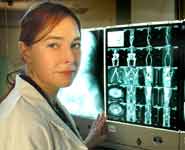If people knew more about how their bodies worked, they might be in with a better chance of staying healthy. Dr Alice Roberts, Senior Teaching Fellow at Bristol University's Department of Anatomy, and presenter on BBC Two's Coast, is on a mission to help people understand the machinations of their major organs and, in doing so, avoid a lifestyle which could be leading them to an early grave. The BBC Two series Don't die young begins tonight, Tuesday, 16 January, at 8 pm.
Britain increasingly seems to be a nation of health "experts" - organic converts, proud of their supplements and detox herbal teas. But many people don't know their lungs from their livers, and wouldn't know where the kidneys fit in if their lives depended on drawing a diagram.
In this six-part tour of the human body, Dr Alice Roberts introduces viewers to the key organs, explaining their functions and idiosyncrasies. She puts her gloves on and gets her scalpel out to dissect animal organs - similar in form and function to human ones - and cuts through the jargon and the myths to find out how we can hold on to our health and live to a ripe old age.
In tonight's opener, Alice meets party girl and mum of two Grainne, from Welwyn Garden City, who, at nearly 40 and with a family history of diabetes, is stressing out her kidneys. Grainne visits the lab to discover more about the body's filtration system and helps dissect a kidney to see the internal workings for herself. Armed with the information, she finally plucks up the courage to take a diabetes test.
Dr Roberts also puts three rugby players through their paces to find out how their kidneys cope under the stress of dehydration, and June from Aberdeen speaks from her own experience about what happens when kidneys fail. She has been on dialysis for four years, and her sister, Lorraine, offers her own kidney. When it is found to be a match, the programme follows the live kidney transplant operation. But the operation is not straightforward and there is a tough call for the surgeon.
Members of the public will also have the opportunity to hear Dr Alice Roberts talk about the popular BBC Two television series Coast and the new BBC Two television series Don't die young at two free public talks. The talks take place on Thursday 15 February and Thursday 15 March at Waddelow Hall, Broadmead Baptist Church, Broadmead, Bristol from 1 to 2 pm.
Dr Alice explains kidney function with the help of a bare-backed volunteer and a paintbrush.
